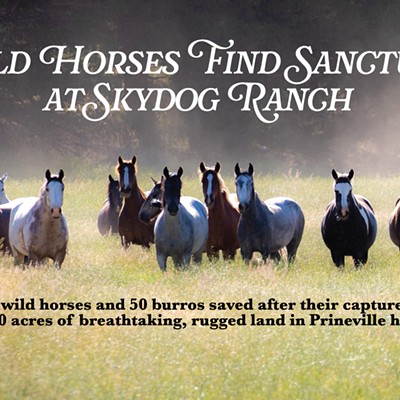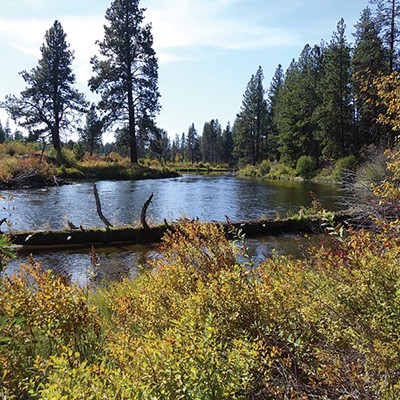There's a push to turn Bend into something called Bike Town USA. And that's not a clever contrivance on the part of the media. Visit Bend, the regional tourism bureau, came up with this name and they plan to make good on the designation, continuing to bring high-profile cycling events to the city this year and beyond to maintain and build upon the momentum provided by the December's Cyclocross National Championships.
There are more cycling events coming to Bend, in addition to the other popular races, like the Cascade Cycling Classic, that have already become mainstays in the area. They might be onto something with this Bike Town USA stuff, but lately the focus of the cycling community hasn't been on these new events, but rather on Skyliners Road.
If Bend is Bike Town USA, then Skyliners Road is its Main Street. The stretch of two-lane pavement that begins on the far west side of Bend and ends in the national forest at Tumalo Falls has long been a popular spot for road cyclists, as well a mountain bikers who might ride up to the Phil's Trail complex. Skyliners, which does not feature bike lanes, is also home to several cycling events, including a locally oriented racing series.
But now, after several years of debate about safety issues and traffic inconveniences for the residents of the Skyliners area, the Deschutes County Board of Commissioners has stepped in. The county has adopted one ordinance aimed at limiting the number of cycling events on the road, while also proposing - then backing away from - another ordinance that would restrict cyclists to ride single file only. These changes and proposed changes have met with resistance from some in the cycling community and still aren't the sort of effective, permanent solutions some Skyliners residents are looking for.
The ordinance and the discussions surrounding making the road single file underscore some of the tension that remains between cyclists and drivers in Central Oregon, even as the region is pushing itself as a bike riding mecca.
On March 3, the county commissioners, who have already once provoked the ire of local cyclists by using a cheap chip seal road repair method on some popular cycling routes, passed an ordinance that requires all cycling events organizers to pay a $100 fee and also limits events to two days. In addition, those wishing to hold events on Skyliners will be required to investigate three other locations where the event could be held and provide an explanation as to why Skyliners is the only viable option. While some established events would be grandfathered, organizers will still be subject to the new fee, expected to research alternative venues for the event and have their event restricted to two days.
Gina Miller, the founder of FreshAirSports, which puts on the Time Trials and Duathalon Series on Skyliners, doesn't agree with the new fees and limitation of event days. Last year the series was held over six different days between June and August, but will be limited to two days this summer, if they decide to do the event at all.
Sami Fournier works for the national organization Safe Routes to School as a bicycle safety instructor and also sits on the county's Bicycle and Pedestrian Advisory Committee. She feels that the ordinance affecting events doesn't do the bike community justice.
"I think it's a punitive ordinance because it doesn't raise any significant funds for the county. All it does is limit the events," says Fournier.
Some in the cycling community have suggested that the restriction of Skyliners races will hurt the ongoing pursuit of bike events and bike related tourism that events like the Cascade Cycling Classic and the Cyclocross Nationals bring. Doug LaPlaca, the President and CEO of Visit Bend, which has been integral in bringing many of the newer cycling events to town, has been involved in the discussions regarding Skyliners Road, but doesn't see the event fee or other changes to the way cyclists ride on this road as hurting Bend's attractiveness for cycling events.
"I think to say that the county implementing a higher fee and considering single-file riding on that road and that this would impact our ability to attract cycling events, well, that's a stretch," says LaPlaca, an avid cyclist who's been known to spin laps at the local criterium and cyclocross races.
Visit Bend is looking at other spots to hold races and LaPlaca says that when the Masters Road Cycling National Championships arrive in Bend in 2011 and 2012, they are looking to do time trials somewhere other than Skyliners. He does acknowledge, however, the appeal of Skyliners and why so many in the cycling community like the route, even if other roads may be safer and in better condition.
"Is it nice and convenient to have races there? Yes, but we have to weigh the importance of having it there or having a safe event," says LaPlaca.
There's plenty of scenic allure to Skyliners as well as a few decades of tradition, which might be tough to reproduce on some of the other rural roads in the area, but what those other roadways might lack, they make up for in good pavement and safety conditions. Skyliners, on the other hand, is beat up - freckled with potholes and lined with cracks - and on top of that, it's going to get even more beat up in the coming two years as the road is torn up in spots to accommodate a city water line. This will almost certainly keep events, at least temporarily, off of Skyliners and also limit recreational use. In the long term, the road will be rebuilt, repaved and possibly even widened, but in the meantime,, the road in its current narrow and damaged state presents safety concerns to motorists and cyclists alike.
Both cyclists and motorists are aware of the safety issues on Skyliners Road. The absence of a bike lane means that drivers cross the center line to pass a cyclist, which is what the law requires in such a situation. Complaints have arisen, however, about the dangers of passing cyclists who are riding in packs of two or three.
"There are a lot of [cyclists] riding back and forth and that's something you really have to think about. You have to be fully aware when you're driving. There isn't much of a shoulder," says David Santangelo, who has lived off of Skyliners for about eight months.
He says he's had no problems with the cycling events last summer, saying they were "facilitated in a well-done manner," but is exceptionally vigilant when driving down the road.
But other residents, like Maggie Kern, who has lived with her family on Skyliners Road for the past three and half years, say that the events block or slow their only route home, in addition to presenting what she says are dangerous situations. She also points out that unlike other rural roads where cycling events are held, Skyliners is a dead-end road with no other way to access homes on the west end.
"We're stuck waiting behind these races and we don't get a notice that they're happening. Unless you're connected to the bike community, you have no way of knowing," says Kern.
Kern favors banning events on Skyliners and also doesn't agree with the notion of widening the road to accommodate cyclists, given that it would mean cutting into the national forest. She does, however, say she's "pro-bike" and doesn't mind cyclists who ride in single file - but takes issue when she turns a corner to find a group of three or four taking up the entire lane.
"I've definitely had to swerve around a curve at 55 mph [the posted speed limit for much of the road] when there are suddenly three bikers riding in a bunch on the road," says Kern.
Eric Chu, a cycling advocate who volunteers for the Bicycle Transportation Alliance and has been monitoring the Skyliners situation, is concerned with these ordinances being specific to Skyliners Road. He wonders if residents who live on other rural roads will come looking for similar ordinances because of the precedent set by the county's ordinance with Skyliners.
"I don't know if Skyliners is worse than anywhere else. You could go out to Alfalfa Road and see that it's a narrow road and ask the county to do the same thing," says Chu.
The other problem with creating a single-file ordinance, according to Sami Fournier, is that enforcement would be difficult, if not impossible. She says that beyond signage instructing cyclists to ride single file, there wouldn't be much additional enforcement - and the signs could also lead to confusion for motorists.
"I'm against the signal it sends to motorists about sharing lanes, says Fournier, "It sends the signal broadly that this is the law everywhere."





















